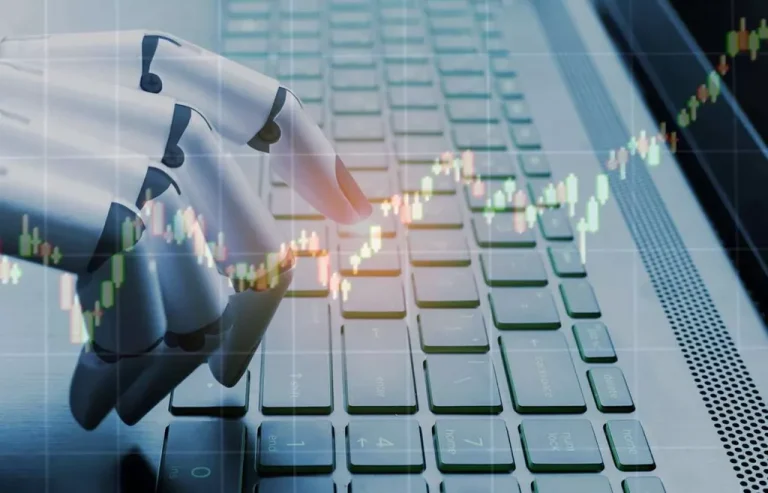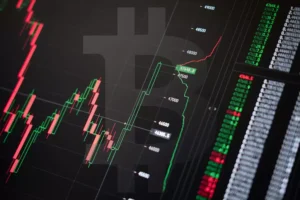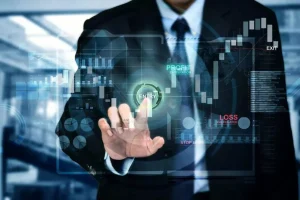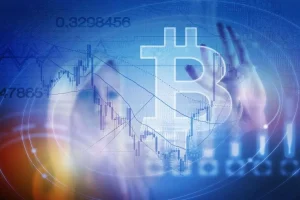Business practices of past decades are becoming obsolete. The experts are looking into increasingly popular technologies to help brokerage companies remain profit-making while keeping pace with the tendencies. AI trading and virtual assistants are valuable resources that specialists have provided to the market. They conduct trades with the help of embedded algorithms and supplied data. The advance of algorithmic trading has increased the prevalence of high-frequency trading.
The potential of AI virtual assistants needs to be improved due to heightened market competitiveness and the advancement of the Big Data area. They started to be displaced in automated trading by robots that think like people while performing better—neural network models and AI. A trader is equipped with a great array of instruments to improve productivity. Market members use trading bots and AI trading tools, in particular.
What is AI trading?
AI is applied in trading to assess, forecast, and automatically execute trades on currency pairs with the help of pre-set entry and exit rules. Automated trading algorithms are more successful at identifying the best entry and exit positions based on price changes by removing the emotional component inherent in live trading. Bots explore the market to find the most significant opportunities grounded on predetermined pricing algorithms, which increase the effectiveness, safety, and simplicity of trading with AI assistance.
AI-assisted trading benefits users who don’t have the time to observe the market and wish to trade with the help of a specific strategy. Forex traders may open several trades quickly by utilizing AI trading systems. It is made possible by the fact that the bot already has all necessary trading rules included, and transactions are carried out automatically.


Turnkey Brokerage Solution For Your Business
Get the most profitable fully licensed fx/crypto brokerage software or ready-to-operate business in 48 hours. Best-in-class web & mobile trading platforms, sales-driven CRM, full integration with MT4/5, and 150+ payment providers.
Benefits and drawbacks of AI trading
The trading process may be flexible using this approach, and the predetermined strategy is carried out precisely. It aids in maintaining emotional control, adhering to tactics with clarity, finding new chances, and examining price movements using various indicators. Additional advantages are:
- Low-stress trading. Using an AI trading system, you may trade without hesitation and without being influenced by your emotions.
- Time and money savings. You won’t have to spend much time checking price charts, using trading methods, or setting orders if you automate your transactions.
- Improved trade efficiency. Artificial intelligence in trading systems assists you in achieving trading objectives since they base the choices on algorithms created by knowledgeable and experienced traders.
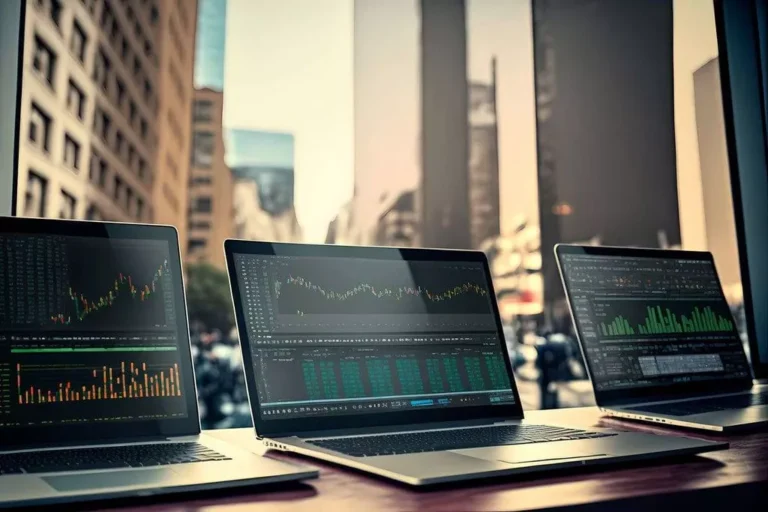
There is a darker counterpart to every bright side. There are some drawbacks to AI as well. Let’s examine a few of them:
- High cost. To keep AI up-to-the-minute, hardware and software must be updated daily. The expense of maintaining and fixing machines is high.
- People may become lazy due to AI because its applications computerize most of the tasks. These inventions lead to addiction in certain people, which could be problematic.
- Without question, robots are considerably more productive when it comes to efficient labor, but they cannot replace the interpersonal relationships that make up a team.
Moreover, when robots take over many monotonous chores and other jobs, human interaction becomes less necessary, which poses a significant threat to employment standards. Every firm strives to replace low-skilled workers with AI-powered robots to complete the same tasks more affordably.
How does AI trading work?
Unlike bots requiring frequent reconfiguration, AI functions autonomously without human involvement. It creates, tests, and refines AI system brokerage methods and uses the recently learned information to improve by taking market trends into account. Overall, AI simulates how analysts think.
Other AI brokerage capabilities that are being employed to the advantage of traders, brokers, funds, and their clients are listed below:
- collecting information to analyze from news sources, social media, and specific websites;
- examining the stock market and index info to analyze;
- selecting the finest mirror trading techniques after ranking and reviewing analysts’ performance;
- building behavioral models amid erratic market conditions;
- spotting instances of collusion and market manipulation.
Moreover, AI cannot experience human emotions like fear and greed.
Is AI trading legal?
Without a doubt, the answer is yes! Nowadays, trading using algorithms and the help of AI are both acceptable practices. It is essential to consider the employment of automation in investing. It is an inevitable component of digitalization. The work of traders is constantly safer and more straightforward with the aid of this technology.
Who applies AI to trade assets?
Who stands to gain from applying machine learning tools for trading? Access and application to AI are available to small and sizable investment businesses.
AI finds its usage in trading in a variety of ways. You can use online trading help and special programs or order specially designed virtual assistants or apps to be developed to cover your specific trading needs. These assistants or applications might give you signals and carry out trades according to your trading strategy.
Top-notch AI tools for trading
You may use a self-created platform or a ready-presented alternative for AI trading. The second one offers greater freedom and a thorough comprehension of the functioning. However, the pre-made system likewise presents some opportunities. The following AI-based brokerage technology resources can help you trade more successfully.
Trade Ideas
Its potent research capabilities apply AI to scan equities and evaluate the result of numerous trading situations. Trade Ideas is a subscription-based service; there are no free trials available. Price notifications and a virtual assistant which uses charts are features of its basic plan.
Tickeron
The AI stock trading resource was developed for individual traders and investors, catering a great array of paid and unpaid AI-powered services. Moreover, it is available as a mobile application, enhancing trader interactivity.
BlackBox Stocks
The platform’s AI applications empower traders to interact with equities and options efficiently. Market evaluation instruments, volatility indicators, and up-to-date quotes alleviate trading and intensify control. All subscribers get access to free lectures and live webinars on the site.
Effects of having and not having AI
The capacity of AI and ML to process and interpret enormous volumes of info considerably more quickly than a person is one of their primary pros and the area in which they are most instrumental. It empowers traders to create predetermined rules for their investments. A computer may be intended to execute artificially intelligent trading frameworks. The investment procedure is smoother and more automated with the use of these solutions.
AI trading calls for a specialized trading program. It connects to a broker, prioritizing order realization and speed. Direct-access brokers likewise decide on the program to link the traders with exchanges or other investors.
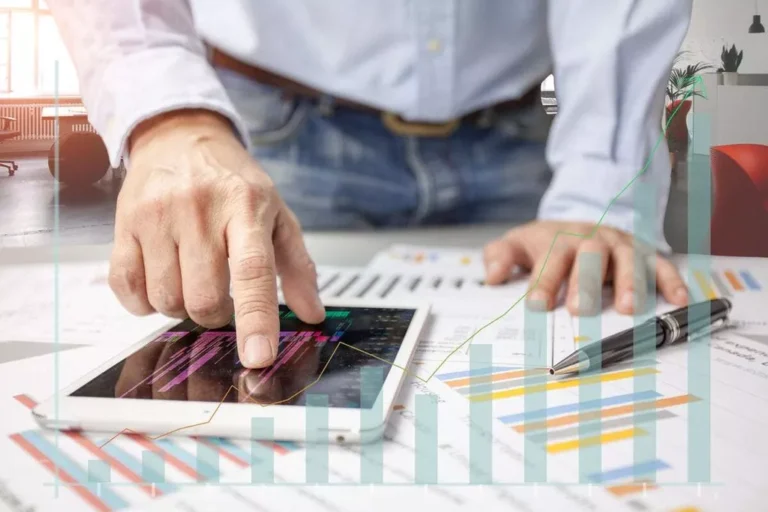
Pitfalls
The idea AI can navigate the complexities of the market has obtained enormous traction in recent years. The notion is that humans are less capable and have less potential than the machines which will eventually dominate the market.
Algorithms created specifically to forecast changes in the market have a significant flaw: they fail. They do not take future fundamentals into account; instead, they solely consider the technical characteristics of the asset and historical price movements.
Every seasoned trader will inform you the market is not there to provide free money. Instead, it’s a competitive atmosphere which penalizes anyone seeking to earn a quick profit by capitalizing on reactive knowledge which has already been included in prices.
One of the most complicated systems, the stock market cannot consistently outperform. A never-ending circle of complexity, it involves collaborative decision-making not just by people but also by robots algorithms. Also, the likelihood of success is low when the chances of each input are added together.
How brokers can benefit from AI
AI applications in trading are already changing it in a variety of ways. Investors could soon discover that, after the present QE-driven boom ends, medium-term returns will be much wretched. Investors would have to revert to the old method of obtaining a reliable financial advisor who can build portfolios and help them choose stocks that will increase in value if the problem passes. In other instances, AI software will serve as the consultant, and the procedure will be completed online.
Traders should get to know this innovation. An up-and-coming area tends to be a great hit in several years. AI is revolutionizing the brokerage area right now. Therefore, it is of great importance to keep pace with it to have a head start.
In the near future, it’s anticipated AI and trading will link even more. The tools and services accessible to investors will grow as AI advances. It is expected trading bots would advance and be able to make better judgments about when to purchase and sell assets, simplifying trading for users of cryptocurrency exchanges.
What Are the Risks of AI in Trading?
The rise of AI in trading has opened up new opportunities for investors, but it also carries certain risks. AI can help traders make decisions quickly, but they are not always right and sound. The reason is that AI is at risk of making decisions based on incomplete or faulty data, and it may not be able to respond to changing market conditions.
AI systems are vulnerable to cyberattacks, which could lead to significant losses for investors. Moreover, regulatory monitoring in AI is lacking. The absence of laws and regulations in the domains makes cybercrime more likely. Personal data about clients may be in danger from technology and automation.
Investors should be aware of these risks and take measures to ensure their AI systems are secure and their data is accurate.
